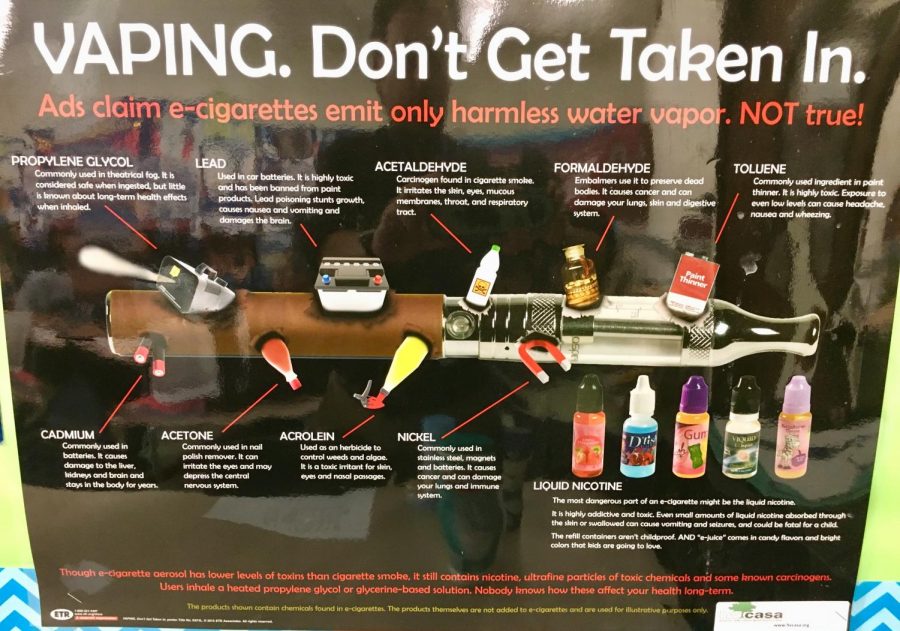Vape-pen popularity increases despite risks
Donovan email parents, students reiterating policy
December 19, 2017
DHS, a smoke-free campus for years, is now having to crack down on vaping. If students are caught with a vape pen — or JUUL — it will be confiscated, said Principal Dan Donovan in a recent email to parents and students.
“Students have no idea what’s in the juices, and they are harming themselves,” Donovan said. “We don’t want to see that on school grounds. There’s no exception to that rule.”
Despite nicotine being a highly addictive substance, a recent Twitter poll conducted by the Hatters’ Herald suggests that 51 percent of respondents from DHS use a friend’s or their own vaping device on a regular basis. According to a 2017 Centers for Disease Control report, “current use of electronic cigarettes increased among middle and high school students from 2011 to 2016.”
It was in 2015 that PAX Labs introduced a new e-cigarette product — the JUUL, which is marketed as an e-cigarette shaped like a USB for a modern design. Since then, it has grown increasingly popular among adolescents and has caused numerous issues with the administration.
“We’ve noticed a huge increase in use since the beginning of this school year,” Donovan said. “We had to send an email home because when we were contacting parents, most of them had no idea what a JUUL was, or that their kids were using them.”
Vaping has been a prohibitive behavior at the school since the devices first surfaced. It’s on the DHS Discipline Code that if a student is caught vaping, he or she will earn a two-day stint in ISS. But now administrators and safety advocates will confiscate the pens and inform parents they can come to school to pick them up. If they are not picked up by the end of the year, they are tossed.
In 2016, the JUUL increased in popularity. Students were found using their JUULs at football games and in the school bathrooms, and that’s when faculty began to take notice. “We [realized] that kids use them in the cafeteria, in the halls, even in class,” says Sue Lamontagne, head of DHS’s safety advocate team.
Donovan addressed the faculty at the beginning of the year about the problem, showing pictures of a JUUL and how students try to pass it off as a USB (it can be plugged into a computer to charge).
Kathy O’Dowd, the coordinator of the district’s nursing services, warns that a JUUL is just as dangerous to one’s health as a cigarette. “Nicotine causes an elevated heart rate and blood pressure,” she explained. “It constricts blood vessels, which over time can lead to hypertension and heart disease. Nicotine is highly addictive, as much as heroin or cocaine is, and when its effects wear off the brain tells the body and it craves more of the drug.”
According to Donovan’s email, administration reserves the right to seize any device that offers nicotine or tobacco consumption if in the possession of a student on school grounds, regardless if it is being used. Then, a student is subject to ISS and a call home.
“I got my JUUL confiscated last month,” said a senior who would speak only without being identified. “It wasn’t about the [fact that I got it taken] away, it’s about how they did it … I wasn’t using it at all. I just had it in my hand [when I was walking into school] and it was taken by one of the safety advocates.”
Donovan said that “having any sort of nicotine device in school is prohibited. Whether the student uses it or not, [administration has] the right to confiscate it because it’s against the rules … There are so many chemicals in these vapes and kids just don’t understand the risks.”
Lamontagne added, “It’s not good for you; it’s just as dangerous as smoking [cigarettes].”
A rising issue with vaping is that people are using them thinking they are not addictive, or that they can be used to break the cigarette habit. But they can actually increase the addiction instead of easing it, like it’s advertised to do.
O’Dowd said students with withdrawal symptoms can be easily spotted by their change in school or job performance, trembling hands, and engagement in “risky behaviors.”
“Kids need to read up on it before using or buying them,” Donovan said. “They give JUULs all these flavors that will make kids want to use them, and then they’re addicted and keep buying them.”




















